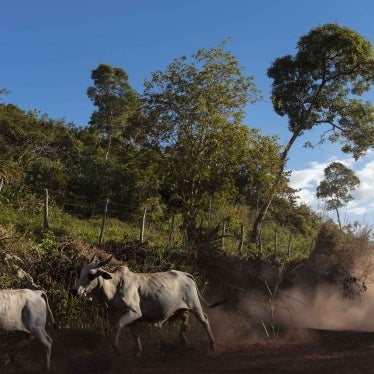A few meters from the public door of Brazil’s Ministry of Agriculture, Livestock, and Food Supply (MAPA), is a separate private door. To better understand who has access to one of Brazil’s most powerful ministries, the investigative group, Reporter Brasil, obtained a private log of those who entered through this second door between January and November 2023. Human Rights Watch helped digitize and turn the handwritten 381-page list of names into a searchable database.
Reporter Brasil identified the ministry’s top 10 visitors. Among them is João Henrique Hummel Vieira, instrumental in founding the Agriculture Parliamentary Front (FPA), the largest group representing interests of industrial agriculture, and Pensar Agro (Agriculture Thought Institute), a powerful think tank known for lobbying. The logs show Vieira made 12 visits. What precisely was on the agenda each time he and others met with officials at MAPA remains unknown.
Similarly, investigative group O Joio e O Trigo recently reviewed 752 meetings between federal government representatives and agribusiness and chemical lobbyists from October 2022 through July 2024 and found that the descriptions of these meeting were often blank or generic.
These new investigations underscore the opaqueness around lobbying in Brazil and the urgent need for robust regulations requiring transparency about what is discussed and with whom, made available to the public through searchable registries.
The lack of transparency is especially concerning since the agriculture ministry’s powers over pesticides dramatically increased in May with the adoption of the “poison package,” overruling President Lula da Silva’s vetoes. Notably, O Joio e O Trigo’s investigation found that agribusiness, chemical lobbyists, and companies increasingly visited the federal offices, during April and May 2024, as Congress was deciding whether to overrule President Lula’s vetoes in the “poison package.”
Widely criticized by local organizations, the “poison package” granted MAPA primary authority over pesticide regulation and opened the floodgates for regulatory approval of harmful pesticides in Brazil, which is already one of the world’s largest users of “highly hazardous” pesticides.
Mandatory lobbying disclosures and searchable public registries are central to good governance. While insufficient alone to curb corporate influence over public offices, they introduce transparency. The European Union, Canada, and US, have publicly searchable registries.
Global conglomerates manufacturing, importing, or exporting pesticides, and companies sourcing from Brazil’s farms should be aware of the heightened human rights risks of operating in environments where stringent pesticide approvals are downgraded, and corporate lobbying is carried out behind closed doors.











